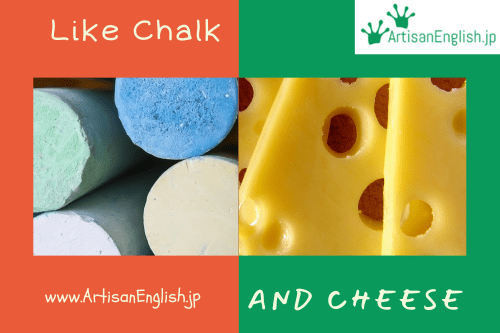
YouTube / iTunes / Spotify / Radio Public / Pocket Casts / Google Podcasts / Breaker / Overcast
Listen to ArtisanEnglish.jp posts & lesson intros here.
Simile: Like chalk and cheese
The simile, like chalk and cheese, is an idiomatic expression indicating the vast differences between two things, just like living in Canada and Japan.
Take, for example, my life journey.
Splitting my time between Canada, the land of maple syrup, beaver tails, jigs dinner and pea soup, and Japan, the nation known for bullet trains and impeccable politeness, has been an eye-opening experience.
Let me tell you, these two countries are like chalk and cheese!
Canada is all about wide-open spaces and a slower pace.
Weekends are spent hiking through national parks or chilling in your backyard.
A man’s home is his castle, after all.
In Japan, everything feels more compact and efficient.
Evenings are a whirlwind of bustling city streets and delicious ramen shops—like chalk and cheese, I tell you!
Food is another significant difference.
In Canada, hearty meals reign supreme.
Think fluffy pancakes with eggs, bacon, and sausages on the side for breakfast, juicy burgers for lunch, and steaming plates of pasta for dinner.
On the other hand, Japan is a land of delicate flavours and tiny portions.
Delicate sushi suppers and meticulously presented aisai bento boxes are the norm.
Our taste buds are like chalk and cheese!
Transportation is another world apart.
Canadians drive, and road trips are a national pastime.
In Japan, however, trains are king.
The bullet train network whisks you across the country in the blink of an eye, making car ownership almost unnecessary.
Like chalk and cheese, it’s two completely different ways to get around.
Living in Canada and Japan has been an enriching experience despite these stark differences.
Each country offers its unique charm.
One thing’s for sure, though – adjusting to life in a place that’s like chalk and cheese from your own makes life interesting!
Flesch-Kincaid Readability Test
This post is understandable by someone with at least an 8th-grade education (age 13 – 14).
On the Flesch-Kincaid reading-ease test, this post scores 63.
The easier a passage is to read, the higher the score on a scale of 0 – 100.

